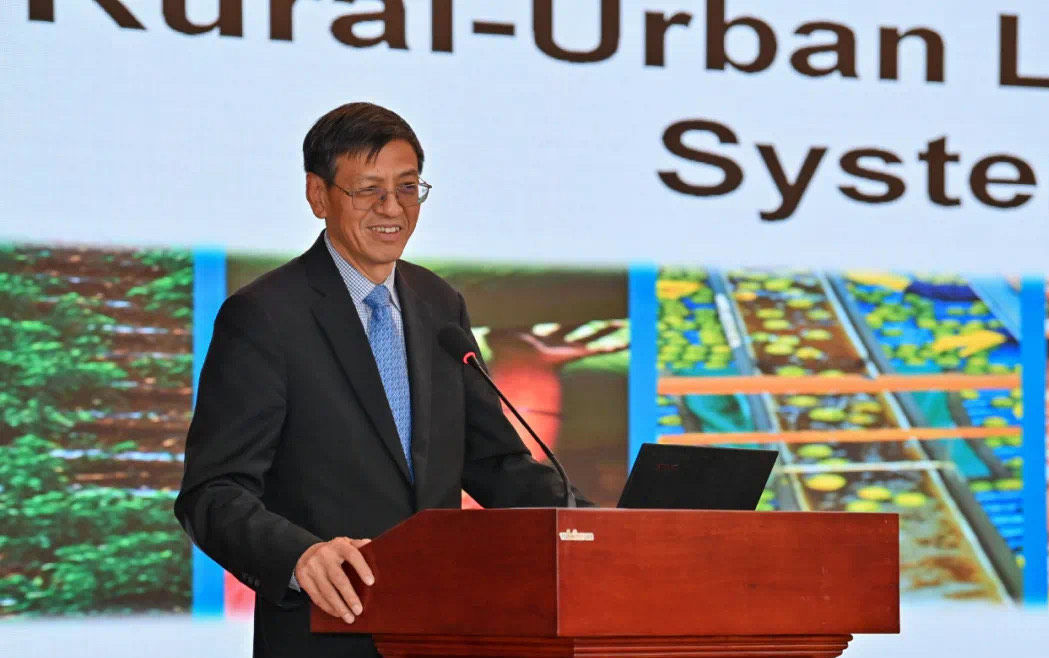China’s rapid economic growth has been driven by urbanization, and vice versa. At the end of 2019, the size of the urban population reached 60.60% of the country’s total, up from 19.36% in 1980. Nevertheless, as Scott Rozelle of Stanford University notes in his new book Invisible China, this trend raises serious concerns about the growing divide between the country’s expanding urban and increasingly “invisible” rural areas.
This topic was the focus of the 2020 CAER-IFPRI Annual Conference in Chongqing, China, Oct. 29-31, co-organized by IFPRI, the China Agricultural Economic Review (CAER), China Agricultural University, and Southwest University. Participants discussed the challenges and potential solutions for urban-rural integrated development in China.
Incomplete agricultural transformation is a significant obstacle contributing to the urban-rural gap, said Shouying Liu, Dean of the School of Economics at Renmin University of China. “Comparing with developed countries like Canada, Germany, Denmark, and the U.S., both the rates of agricultural return and agricultural labor productivity are too low in China,” he said. These can be improved through the recombination and upgrading of various agricultural production factors, including social institutions, technology, and entrepreneurship—contributing to agricultural transformation, rural development, and stable urbanization.
“There exist multiple pathways to strengthen rural-urban integration,” said Shenggen Fan, Professor at the College of Economics and Management at China Agricultural University. “Pathways include improving policy coordination and public investment, supporting efficient and inclusive rural-urban value chains, leveraging towns and intermediate cities, promoting social protection and rurbanomics [emphasizing the interdependence of rural and urban economies] adoption. Rurbanomics focuses development policies that will ensure greater attention to rural needs,” Fan said.
Improving farmers’ welfare is another important challenge, said Dan Yang, a professor at the College of Economics and Management at Southwest University. The competition between farmer cooperatives and investors-owned firms helps in this regard, she said, while joining cooperatives has been shown to increase farmer income.
Rural communities worldwide are at risk of rising poverty due to the COVID-19 pandemic, Rob Vos, Director of IFPRI’s Markets, Trade, and Institutions Division, said at the keynote session. A 5% pandemic-driven global economic downturn could increase the number of extreme poor by almost 150 million—84 million in rural areas—IFPRI projected, with heterogeneous impacts on food security and malnutrition. COVID-19 lockdowns and other restrictions lead to lower incomes, households save by buying less relatively expensive nutrient-rich foods, and diets become less healthy. Globally, the pandemic may lead to about 200 million more people unable to afford nutrient-rich diets, Vos said.
The rural poor are considered more vulnerable, but their connections to urban economies can help. “Urban-rural linkages are capable of tackling these challenges while promoting the benefits of rapid urbanization for food security and nutrition,” Fan said. It’s important to recognize the significance of urban-rural integrated development, he said, not only for narrowing the divide but for creating a more resilient food system.
Roundtable session conversations focused on developing urban-rural integration in the post-COVID-19 era. Liu noted the limited income sources for Chinese famers in the present. “To involve more farmers in non-agricultural activities, there should be an institutional development for opened [production] factor markets in rural China,” he said.
Professor Hans Westlund of the KTH Royal Institute of Technology noted that by itself, boosting agricultural productivity is not enough; new types of employment are necessary for rural areas to survive. Purdue University Professor Holly Wong suggested that China needs strategic policies to address its systematic issues and reduce the economic gap between rural and urban areas. “Policies for rural revitalization, better education and health care in rural areas are good policies for filling this gap. However, we need to be careful that policies are not aiming for keeping more rural people living in the countryside, but for attracting more urban people moving to rural areas.” Wong said.
Movement between rural and urban areas should go in both directions, said Kevin Chen, Director of the Zhejiang University-IFPRI Center for International Development Studies. “In the future, more efforts are needed to ensure equal access of both rural and urban people to public services, and to break the intergenerational transmission of poverty,” he added.
In the keynote speech, Jayson Lusk, Head of the Purdue Department of Agricultural Economics, analyzed what makes a good food policy—one that is efficient, equitable, able to solve a market failure without unintended consequences, and preserves freedom—casting light on effective policy evaluation for urban-rural integrated development.
The CAER-IFPRI Annual Conference is one of IFPRI’s flagship events in China and has been held 12 times. Wei Si, Dean of College of Economics and Management at China Agricultural University, Zhiyong Zhu, Dean of Economics and Management at Southwest University, and Rob Vos delivered opening remarks this year. Around 130 scholars attended in person and more than 10,000 viewers watched the keynote session online.
Watch the 2020 CAER-IFPRI Annual Conference Keynote Session.
Donghe Li is a Communications Assistant with IFPRI’s East and Central Asia Office in Beijing.







